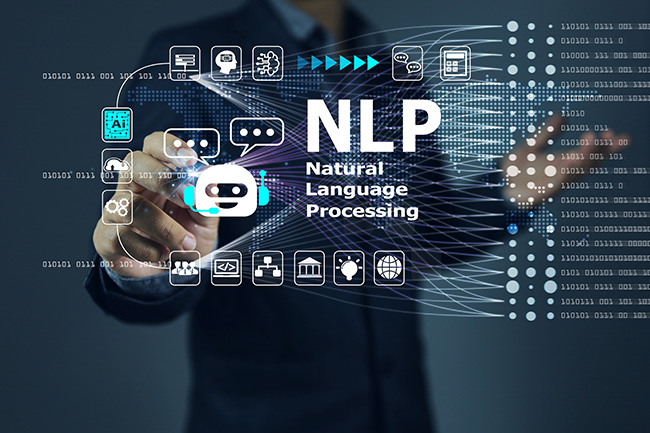Natural Language Processing (NLP) is one of the AI branches that concerns the relationship between computers and human language. It has experienced a great leap in development, and there is a greater number of businesses that give NLP a major role in their operations. In the age of digital media where communication is the key, NLP represents an essential part of the system. Data from recent statistics indicate that the NLP market is expected to grow at a compounded rate of 27% during the forecast period 2023-2032 and reach a potential of $91 billion in 2032, which showcases its importance in different industries – including NLP in digital marketing.
What Is Natural Language Processing (NLP)?
Natural language processing is a branch of Artificial Intelligence which enables computers to understand, interpret, and create human language that is understandable and context-oriented. The ability to process a large volume of natural language data is provided by algorithms and computational models.
How Does Natural Language Processing Work?
Through NLP, computers process massive amounts of language data and use machine learning algorithms to identify relevant patterns and generate appropriate responses. These include tasks like emotion detection, entity recognition and language translation. Similarly, NLP & digital marketing systems can use statistical and machine learning approaches that can derive knowledge from data, which enhances their performance as they get to learn more and more.
Difference Between NLP, AI, and Machine Learning
Technology encompasses three areas: Natural Language Processing (NLP), Artificial Intelligence (AI), and Machine Learning. These areas each hold their own significance, which should not be misunderstood or mistaken for one another.
Let’s look at the differences:
Natural Language Processing (NLP)
NLP is a translator that connects humans and computers on the level of verbal communication. It allows computers to be able to understand, interpret and respond to human language as they do in a way that can be understandable to humans. The role of NLP is to handle activities including language translation, sentiment analysis and chatbot interactions. It is about equipping computers to comprehend and produce text to resemble human speech.
Artificial Intelligence (AI)
AI stands for artificial intelligence which refers to the umbrella term whereby machines are programmed to perform functions that humans commonly do. It is conversely about designing intelligent machines which can do the tasks that we don’t explicitly programme them to do. Nonetheless, NLP is one of the AI subsets – a much wider scale ecosystem that ranges from problem-solving, perception, and decision-making.
Machine Learning
Machine learning is a part of AI which is aimed at designing or creating algorithms which machines can use to learn, train and perform predefined tasks. Unlike conventional programming, where machines are explicitly designed to perform a given task, machine learning machines engage in pattern recognition and inference to increase their performance. It is similar to training a machine to learn to discern patterns and make decisions based on them.
Now, let’s break down the differences between NLP, AI, and Machine Learning in a table:
| Aspect | Natural Language Processing (NLP) | Artificial Intelligence (AI) | Machine Learning |
| Definition | Involves interaction between computers and human language. | Encompasses machines carrying out tasks that require human intelligence. | Focuses on developing algorithms enabling machines to learn from data. |
| Goal | To enable computers to understand, interpret, and generate human language. | To create smart machines capable of performing tasks without explicit programming. | To allow machines to learn from data and improve performance over time. |
| Scope | A subset of AI specifically focused on language-related tasks. | Broader concepts covering problem-solving, perception, decision-making, etc. | A subset of AI, concentrating on the development of algorithms for learning from data. |
| Examples | Language translation, sentiment analysis, chatbots. | Autonomous vehicles, virtual assistants, facial recognition. | Image recognition, recommendation systems, predictive analytics. |
| Application Area | Interpreting and generating human-like language. | Performing tasks that typically require human intelligence. | Learning from data to make predictions or decisions. |
Impact Of NLP On Digital Marketing
NLP, or Natural Language Processing, has several significant effects on digital marketing:
1. Improved Customer Insights:
One advantage of Natural Language Processing (NLP) is its ability to improve customer insights. Through examining social media language, reviews, and feedback forms, NLP facilitates a more precise comprehension of consumers’ sentiments, preferences, and opinions. This grants marketers the power to craft digital marketing strategies that better address their desired audience’s needs and expectations.
2. Enhanced Content Creation:
NLP algorithms boost content creation by providing marketers with the ability to create tailored and effective marketing messages that are rooted in language usage trends. Leveraging NLP-powered tools, exceptional copy can be crafted for diverse platforms like websites, blog posts or social media updates; as well as developing email campaigns that connect seamlessly with readership preferences.
3. Personalized Customer Experiences:
By leveraging NLP technology, marketers can deliver unique customer experiences that are personalized to individual behavior, preferences and demographics. This highly targeted approach enhances engagement and encourages brand loyalty among customers leading to heightened levels of overall satisfaction.
4. Efficient Chatbots and Virtual Assistants:
With their advanced comprehension of user inquiries, chatbots and virtual assistants employing NLP technology are highly efficient in resolving issues, offering purchase guidance, and responding to inquiries promptly to enrich the shopping experience with a greater sense of speed.
5. Semantic Search Optimization:
Semantic Search Optimization involves utilizing NLP technology to enhance search engine understanding of user intent and context, allowing marketers to optimize their digital content more efficiently. As a result, more relevant results are delivered to users. Incorporating semantic search principles into their content allows businesses to increase visibility and rankings on various platforms which ultimately boosts organic website traffic – a significant advantage for them.
6. Sentiment Analysis and Reputation Management:
The utilization of NLP in Sentiment Analysis and Reputation Management facilitates marketers to scrutinize online discussions and emotions related to their brand, products or services. With the examination of sentimental data, they can detect potential PR disasters as well as cater customer grievances properly while competently managing their brand image on diverse digital platforms.
7. Automated Text Analysis and Insights:
NLP algorithms are capable of performing automated text analysis and providing insights. These can be used for deciphering important trends in vast amounts of data, encompassing customer reviews, social media posts as well as survey responses. Harnessing these insights is beneficial for marketers seeking to track competition performance while identifying evolving market demands- aiding their digital marketing decisions towards a data-driven optimization path.
Use Cases of NLP in Digital Marketing
NLP has been a key factor in shaping the communication channels between businesses and their consumers as part of digital marketing. The breakthrough in NLP & digital marketing and interpreting consumer language enables marketers to focus on interest-based campaign segmentation, consumer engagement, and one-upmanship over the competition. NLP-based tools play a vital role in getting to know the customers better and developing communication strategies that are more adapted to the customers’ liking.
Let’s take a closer look:
- Chatbots for Better Conversations: NLP helps create chatbots that talk to customers online. These virtual assistants give quick answers, making customers happy and engaged.
- Understanding Feelings with Sentiment Analysis: NLP’s sentiment analysis checks how people feel about a brand. Social media posts and reviews can tell you in many ways what people either like or don’t like about your company. This gives your brand the ability to create strategies that resonate on a personal level with the audience.
- Writing Perfect Content with Semantic Analysis: NLP’s semantic analysis understands the meaning behind words. It makes it possible to develop content which can be understood by the audience. Through the analysis of the context, companies will be able to come up with content that meets the customer’s demand.
- Dominating Voice Searches: NLP is crucial for voice searches. It helps devices understand natural language questions. By optimizing for voice searches, businesses stay visible in voice-activated searches.
- Short and Impactful Content with Summarization: NLP’s content summarization helps create short but powerful content. In the digital age where attention is short, this is crucial for ranking high in search results and keeping the audience interested.
- Knowing Market Trends and Competitors: NLP is used in the task of monitoring market trends and knowing what rivals are doing. Market sentiments and competitor strategies comprehension help companies adjust their business tactics and enter the battlefield fully armed.
Real World Examples of NLP Marketing
In the world of marketing, examples of successful NLP applications abound, reshaping how brands connect with their audiences. Let’s look at how useful NLP is to marketers by looking at giants like Amazon and Netflix.
1. Amazon’s Personal Shopper:
How it Works: Amazon’s recommendation engine is powered by NLP algorithms. The purpose is to do more than just suggest products. It’s like having a personal shopper that understands your preferences.
Impact: This recommendation system powered by NLP technology is a revolutionary tool with substantial impact. It has significantly contributed to the growth of Amazon’s e-commerce sales as it studies and interprets user behavior, providing customized product recommendations that enhance individual shopping experiences.
2. Netflix’s Content Wizardry:
How it Works: Netflix utilizes NLP to analyze viewing habits, reviews, and searches. It doesn’t just recommend shows; it predicts what you’d enjoy watching next.
Impact: By tapping into the power of NLP, Netflix keeps viewers engaged. It enhances the overall streaming experience, making users feel understood and valued. This not only retains subscribers but also contributes significantly to Netflix’s vast content consumption.
3. Chatbots as Instant Allies:
How they Work: Websites deploy chatbots armed with NLP capabilities to engage users. These virtual assistants understand natural language, providing instant and relevant customer support.
Impact: Brands like Amazon and Netflix leverage chatbots to ensure users get immediate assistance. Whether it’s answering queries, resolving issues, or guiding customers through a website, these chatbots offer a seamless and efficient support system, enhancing user satisfaction.
4. Sentiment-Driven Marketing:
How it Works: NLP doesn’t just process information; it gauges sentiments. Brands use sentiment analysis tools powered by NLP to understand how customers feel about their products or services.
Impact: This sentiment analysis helps in crafting targeted marketing strategies. If there’s a negative sentiment brewing, brands can swiftly address concerns and tailor their marketing messages to resonate positively with their audience.
5. Email Campaign Precision:
How it Works: Email marketing becomes smarter with NLP. By analyzing user behavior, preferences, and interactions, NLP can tailor email campaigns for individual users.
Impact: This personalized approach significantly boosts email campaign effectiveness. Users receive content, offers, and recommendations that align with their interests, fostering a deeper connection between the brand and the audience.
Conclusion
In today’s quickly evolving digital landscape, it is essential for marketers to integrate NLP into their strategies. This allows an understanding of the nuances in language and creates unparalleled chances for developing customized and effective campaigns that lead to increased success.
Consider Aumcore’s digital marketing services for expert guidance on optimizing NLP in your overall strategy.
To explore the upcoming developments in digital marketing, refer to Aumcore’s blog post about Future Digital Marketing Trends.





Tell us your thoughts in the comments